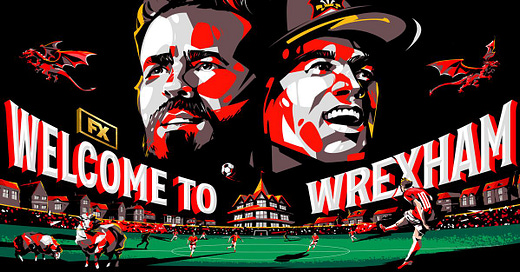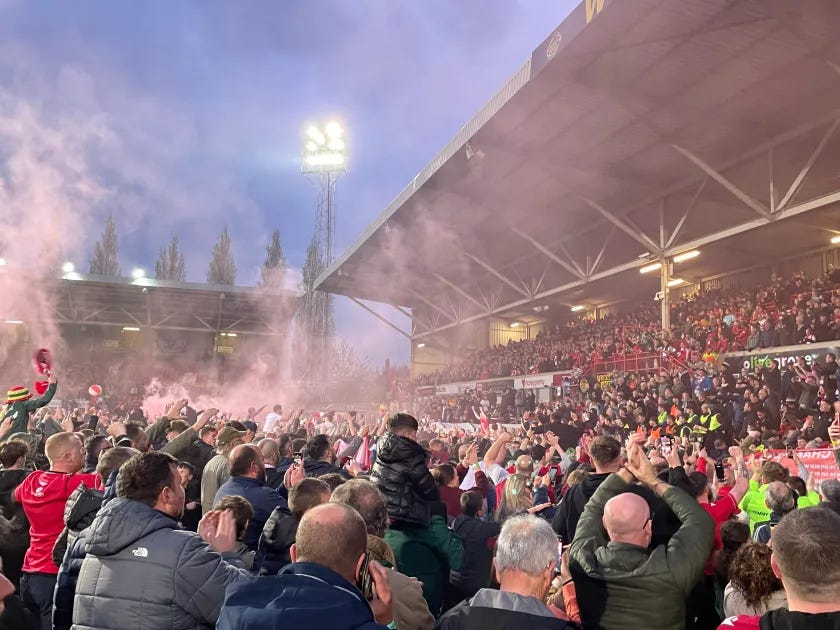Is Not About Just Being Successful on the Pitch - it's About Bringing Joy to a Community
Wrexham executive director, Shaun Harvey, the former CEO of the Football League tells Rich and Rob that Wrexham have shown that success should be measured in community not financial terms.
It often gets lost amid the relentless focus on profit, loss, ownership, prize money and exorbitant wages. But when you boil it down, isn’t football at its best when it brings people together? In fact, for most of us, hasn’t that been its purpose all along?
Shaun Harvey has been involved in football for most of his working life. The managing director of Bradford during the club’s time in the Premier League, the CEO of Leeds United during one of the most troubled periods in the club’s recent history and then the chief executive of the Football League, Harvey has experienced pretty much everything the sport can throw at you during his career.
Now he’s an executive director at Wrexham, and a crucial figure in a sporting revolution has captured the imagination, not just in North Wales but across North America too.
But while Wrexham’s rise from the National League to the Championship in successive seasons has been little short of a fairy tale, Harvey’s own approach is steeped in a commodity that can often be in short supply in modern football.
Namely common sense, and the kind of shared values that bond, not just supporters of a football club, but also entire communities.
“When Rob and Ryan bought the club we had the conversation about what they wanted to achieve?” says Harvey in the latest Rich and Rob podcast.
“Success on the pitch is an easy answer because everybody involved in football wants to be successful on the pitch. But the real answer wasn't a financial return on investment. That wasn't the motivation.
“It might be the end result, but it wasn't the motivation in the first part. The first place was to deliver benefits to a local community that had long been looked over, was down on its luck, was from a working-class area.
“The Wrexham story would never have worked in one of the suburbs around London. It had to be that working-class area. But in the UK and football and finance and the business reporters around football, we've got this really unhelpful way of doing things where we want to try and convert everything into a financial metric.
“Everything's got to be measured. It's the one thing that we all believe genuinely you can compare.
“And my view of it is, the self-esteem that's been generated in Wrexham through the success of the football club and then the profile that that success through the documentary has created is worth far more than any amount of financial return.
“Because you've got people who are waking up in the morning proud to say they're from Wrexham now.
“Now that's not happened before. So don't anybody try and put a financial value on that. Because actually putting a financial value on it destroys it.
“What you've got to do is ask the people of the town - how do you feel as a result of this? And if somebody now says, ‘Yes, I'm from Wrexham’, rather than I'm from North Wales, or, God forbid, I'm from a town near Chester, then you can see the real positive impact that's been made.
“We've seen loads of examples of (people saying) I was going nowhere, I was struggling, but this has given me some belief.
“It's been great.
“For me, keep your P&L and your balance sheet. If the motivation of the football club is to do the right thing and benefit the community, let's try and create another measure that doesn't put the spotlight on pound, shilling and pence.”
But this isn’t a phenomenon that’s exclusive to Wrexham. The Welsh club is merely one of the most high profile examples of what can happen when a football club gets on a roll and starts producing the kind of magic that make its inhabitants feel ten feet tall.
From a social cohesion perspective, football clubs have long been recognised as one of the most critical elements of British society. In the 1980s, football clubs were seen as a symbol of decay, with supporters grouped together by the Tory government of the day, as discordant rabbles bringing trouble at 3pm on a Saturday.
Now we live in a very different world, although whether enough is being done to ensure that the 92 football institutions that provide meaning to so many people’s lives (not to mention the hundred of non-league clubs that do likewise on a smaller scale) are able to survive and thrive is a moot point.
What Wrexham so clearly demonstrate, though, is the link and also the distinct divide between running a football club in a business sense, and creating an organisation which brings pride to the local community.
“The goodwill factor and the self-esteem element is the byproduct of the football club doing well,” says Harvey.
“And actually, that then creates a multiplier that just doesn't exist in most towns. As Rob said, you don't have that multiplier in Sheffield at this moment in time, yet in Wrexham you do.
“And I genuinely think it's a sort of advantage that a single city club or a single town club has the advantage of, because there isn't a divide.
“Generally, a unified community and club gives you the best chance of success. Again, another example I use is when you look at who actually owns a football club.
“The reality is that a football club is owned by the community. Whether that's the fans that go through the turnstiles or whatever the definition of community is - that's where its heart and soul lives.
“Because we know that if those fans don't turn up, that football club cease to exist in one form or another.
“What the equity owners own is the ability to play in any one division at any particular time. The Abu Dhabi group that own Manchester City own the right to play in the Premier League. The owners of Tranmere Rovers own the right to play in League Two.
“So that's how I split between ownership - one owns a right to play in a division, the other one is the football club itself.
“But to be successful, both have got a joint responsibility to make sure that you make the absolute best of the opportunity that both of you have to maximise the effectiveness of that football club in its local community.”
Ultimately, the impact that football can have goes beyond community in its broadest sense, and into the individual connections that knit these communities together.
And Harvey believes that its here, football can have its greatest impact.
“How many times have people said... I've got to go and see my parents, or I need to go and see my uncle - and it's this, ‘I've got to go’ and, this big sigh,” he says.
“Yet, if they go to the football together, there's 23 appointments to view, appointments to meet, every single year.
“And you're actually doing it in an environment together, where everybody wants to be there. So, I actually think, spectator sport keeps family groups together on a far more regular basis, because it's easy.
“I'll see my dad at the football on Saturday, or I'll see my mum, or I'll see my sister - I know they've got tickets three or four rows back. I'll have a word with them on Saturday when I'm there.
“It creates a level of social engagement, way beyond that that any other part of society allows us to benefit from.
“If you've got a season ticket and you've been sat in the same sort of group of 10 people, you probably never even knew each other when you started. But the reality is you probably know more about that person and what they're doing.
“And you can guarantee if they don't turn up for two weeks, somebody's asking the question, ‘are they all right?’
“Everybody's equal when they go through the turnstiles. Everybody's equal. Listen, unless you're in one of those weird and wonderful situations, the bottom line is the person sat in the seat next year is paid exactly the same as you.
“And it's a classless system - it allows people to have conversations about things that they would never do or different demographic groups actual mixing together in a place they want to be.
“And this is why I've long advocated that government genuinely needs to look at sport in that really positive way and what it can bring, not it's a drain on resource, or a public service can't support it.
“Ultimately, when a football match is on at 3 o'clock, there's a group of people in 46 stadiums up and down the country. Everybody knows where they are. Everybody knows what they're doing. And ultimately, it's an event to be celebrated.”
If there’s a better summation of football’s purpose in 2025, then Rich and Rob haven’t heard it. Have you?





